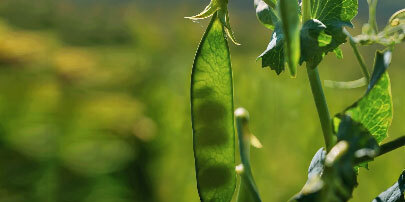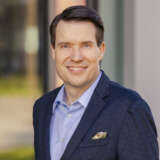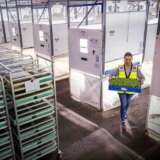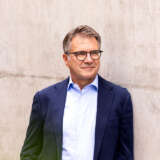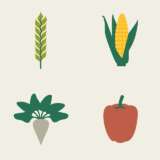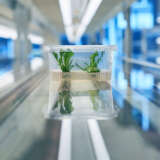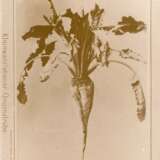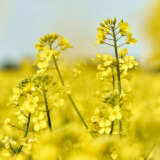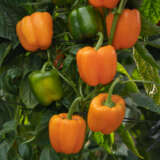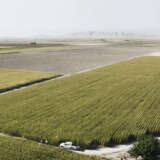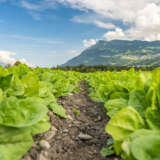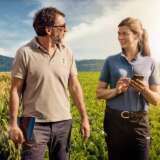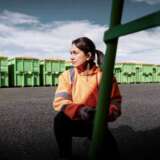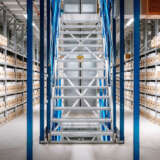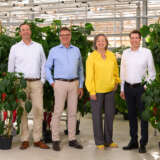A treasure trove
of breeding work
In order to develop high-performance varieties for agriculture, breeders specifically look for plants with desirable traits for crossbreeding purposes. The high-quality seeds for this breeding work are processed and safely stored in special facilities. The largest and most modern KWS facility of its kind has recently been installed at the company’s headquarters in Einbeck. It significantly expands the capacities for beet, oil and catch crop seeds, thereby creating more space for diversity.
Insights into what it looks like in the new Seed Inventory
The quantities of seed required for breeding new varieties have also increased at a pace with KWS’s steady growth. Besides general breeding programs, those that focus on specific traits such as drought tolerance or resistance are gaining importance. This is why KWS began building its new Seed Inventory at the Einbeck site in 2022. Spanning a floor area of 13,000 square meters, the new building has significantly more storage space than its predecessor. “The new Seed Inventory provides space to safely store up to 1.3 million seed lots of sugarbeet, fodder beet, oilseed rape, catch crops and peas,” explains Robert Heidhues, Head of Global R&D Business Functions. “It primarily houses material from current and past seed multiplications of our breeding programs, which makes it a treasure trove of our breeders’ knowledge.”
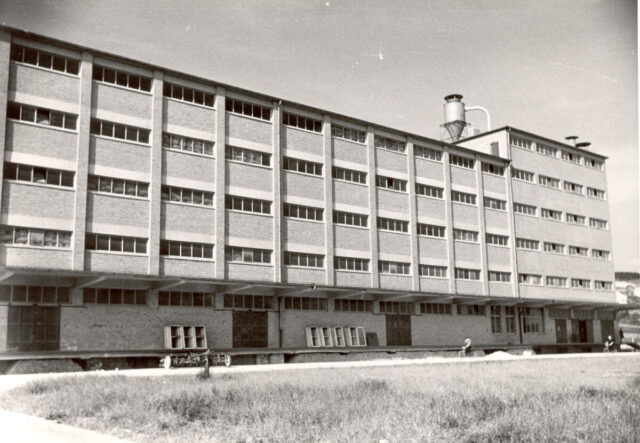
The building that previously housed the Seed Inventory was completed in 1948, making it the oldest at the company’s headquarters.
Best conditions for seeds
To provide the best possible protection for these valuable goods, the storage rooms operate at optimum climatic conditions. A temperature of 6 to 8 degrees Celsius and 30 percent humidity ensure that the seed’s germination capacity is maintained, and pests cannot thrive. This allows samples to be stored safely for well over 10 years.
However, before finding its way into one of the high-bay warehouses, the material must first undergo several processing steps. Among other things, it is dried, freed of foreign material, cleaned and sort-ed by size. Unlike in the old building, all processing steps occur centrally on one level. The team at the Seed Inventory – comprising 50 permanent employees and up to 85 seasonal workers – can accept and process around 60,000 batches a year thanks to optimized processes. Ranging from small plant parts to sacks weighing 25 kilos, these batches come from all over Europe. If a breeder requests stored seed, it is prepared in a further step before delivery: for example, it is equipped with a protective cover, color or plant protection.
Time-lapse building camera
Diversity for plant breeding
For a new variety to meet the high demands of agriculture, it must combine many positive characteristics and offer obvious added value compared to existing varieties. To achieve this, breeders select plants with the desired traits and repeatedly crossbreed their most promising offspring in a selection process lasting several years. Each crossbreeding cycle contributes toward a new line that will ultimately combine several advantageous features. Both the starting material for this breeding work and seeds from the ongoing breeding process are stored in the Seed Inventory so that they can be accessed again at any time. In addition, parts of the basic seed and other precommercial oilseed rape and beet seed are stored here.
Genetic diversity is the basis for developing high-performance and resistant varieties”
says Robert Heidhues. “With the new Seed Inventory, we can process significantly more seed samples and store them in ideal conditions for our breeders. In this way, we take the rising variety of products for farmers into account. This constitutes an important success factor in our increasingly diverse markets.”
KWS background
Focus on sustainability targets
KWS attached great importance to sustainability when planning the Seed Inventory. The waste heat from a nearby sewage treatment plant is used to supply heat. The energy generated with a heat exchanger corresponds to the energy requirements of around 100 modern detached houses. In contrast to the old drying system, the warm exhaust air is also dehumidified in the new building and fed back into the drying process. Sustainable electricity is supplied by photovoltaic modules on the roof of the building. With these measures, the Seed Inventory conforms to KWS’s ambitious climate targets: The company aims to reduce its scope 1 and scope 2 emissions by 50 percent by 2030 and to achieve “net zero” by 2050. (About the KWS Sustainability Ambition 2030).

